
You are logged in as
Logout
You are logged in as
Logout
Dear Parents and Caregivers
The NCEA year continues to roll on with a lot of assessment taking place as part of the overall teaching and learning programme in the Senior College. As we head towards Term 3, the ‘moving term’, there are a number of issues and reminders that I would like to cover. We’re already into Week 18 of the academic year, with (amazingly so!) just 15 weeks left, so this newsletter encourages busy parents to take a few minutes to check in on your student’s progress in their NCEA journey and to look ahead at what is to come in Term 3. How is it looking for your child?
At all times, please feel free to contact me via email with any questions that you may have about NCEA at DBV@stac.school.nz.
Kind regards
David Bevin
Head of Teaching and Learning

Internal assessment is obviously the big concern for students this year. Most students will be assessed in, on average, 15 – 20 internals across the year. A few students will gain their NCEA through internal assessment before they even sit the external examinations in November and, as such, internal assessment is ‘high stakes’. We have clear rules and procedures for students to follow covering many matters including student absence from an internal, late submission and breaches of authenticity and these are all detailed in the student copy of the ‘Rules and Procedures’. Last term all students received their own copy of the ‘R & P’ in which all the details are outlined. But, even so, there are a number of recurring issues to highlight.
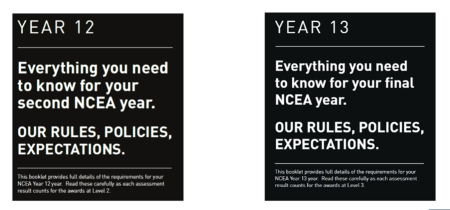
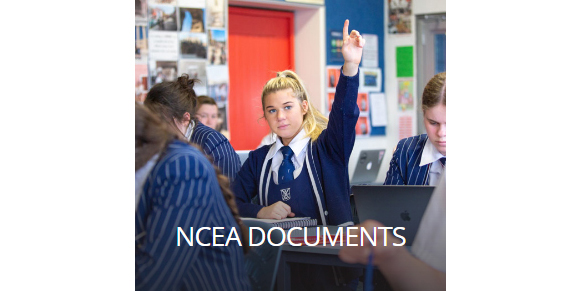
Issues around extensions and absence from assessments occur every year and have begun to occur already so it is important for you to know that we have clear processes and rules for managing those issues so that assessment is fair to all students. Students simply cannot just hand in an assessment late or not turn up to a test without having a valid, and approved, reason. They must follow our procedures in this area.
Earlier in Term 1, a post was placed in each year level’s Teams page providing the link to the online form for applying for an extension in an NCEA assessment. It is really important that students follow our rules for assessment so that we are being fair, consistent, and transparent in all assessment situations.
There are several steps for you to follow with each internal assessment.
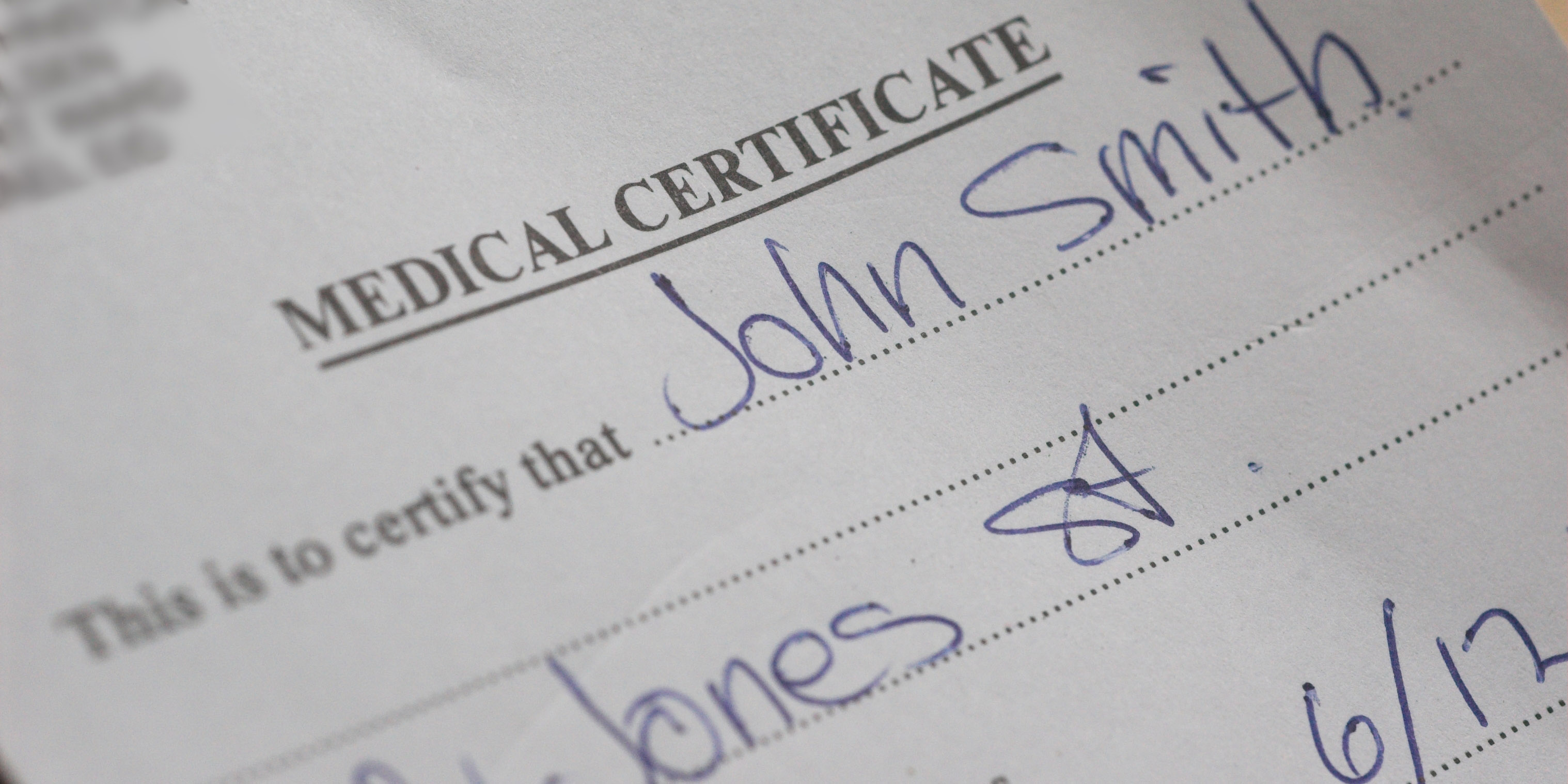
For medical conditions, students must provide a medical certificate as part of their application as shown here; If they do not, they will not have an extension. This is non-negotiable on the school’s part.
COVID-related illness – our system is designed to handle this situation that has been occurring frequently over the last few months. Students are not required to visit their doctor to obtain a medical certificate. They are still required to provide proof of their COVID illness and this can be done in the form of a photo of the positive COVID test that is uploaded directly to Mr Bevin as an email attachment along with the student completing the above application form.
All students are required to sign a College Authenticity statement each year that underlines the importance of what we call academic integrity. Simply, students should not produce and submit for assessment work that is not their own. They may reference other work but must do so formally and according to the guidelines they receive from their teacher; if a student breaches authenticity, they will likely receive a grade of ‘Not Achieved’.
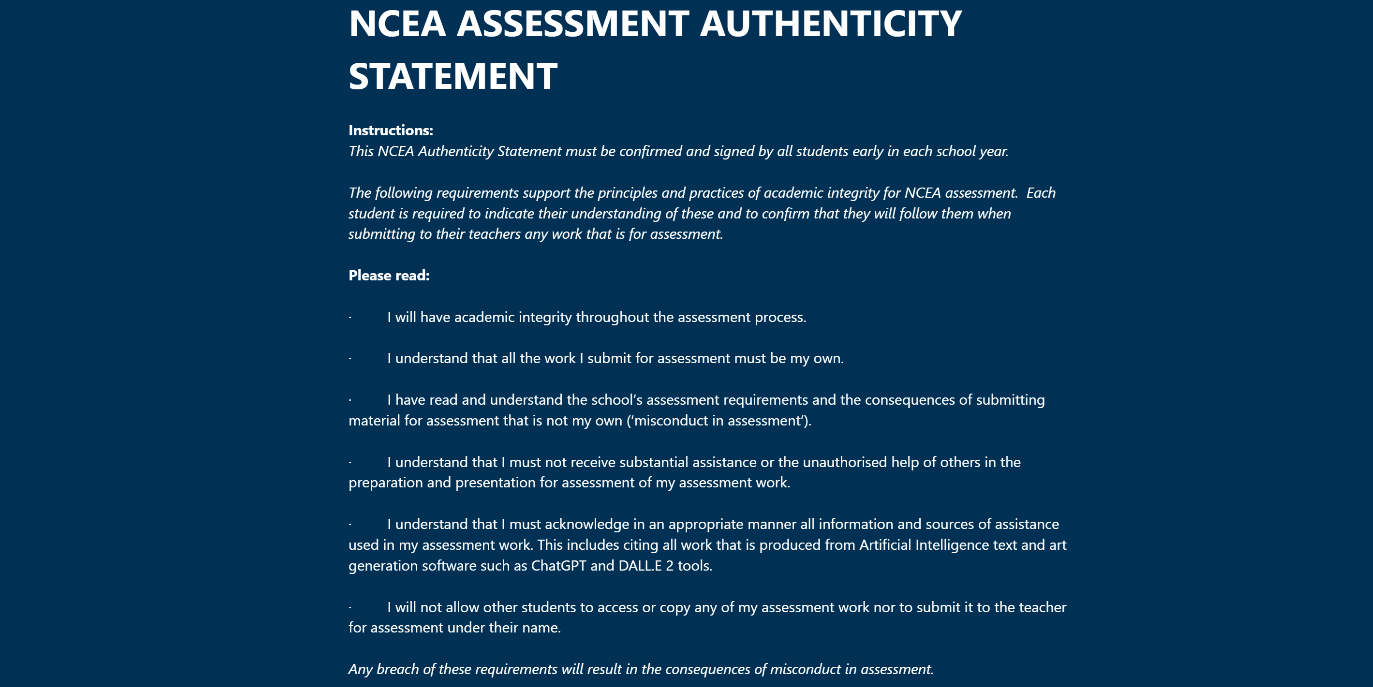
Much assessment requires students to submit work online such as through a Teams submission. While we are all aware of the sometimes-unpredictable nature of technology, students are expected to still submit work on time and as required for their assessment. Students are expected to make copies or backup their work so that, in a situation of technology failure, they are able to access a copy of their work and submit it on time. Work that is submitted late, even if technology failure is a factor, is just that, late and will not be accepted for marking.
This very important calendar provides overview information about what assessments are on when, according to each Year level. Please note that assessment programmes are of necessity a little ‘fluid’ and therefore dates sometimes change; teachers are expected to keep students and parents informed of such changes so please understand that what is on the Calendar, while it’s accurate, is not ‘set in stone’. The Calendar provides an important way of helping your student to programme their commitments term-by-term.
If you look back at the year ‘journey’ you’ll see that the next term is 10 weeks long and that there’s likely to be a lot going on in your child’s academic life for one thing. There’ll be more on that in my next newsletter early next term.
By early July, the Assessment Calendar will show assessment dates for internals in each subject, and it will be a good exercise to sit with your child and check out what they have coming up. The College Prelim examinations, timed for the period 11–20 September (dates to be confirmed), are very important events in a range of ways and do need to be prepared for and taken seriously. In my previous newsletter I informed parents about the requirement for students to be present at each of their examinations and this will be reiterated in subsequent newsletters in Term 3.
Let’s just a look at what’s coming over those 10 weeks and understand what it is likely to mean for students. This table pretty much speaks for itself as follows:
|
TERM 1 |
11 WEEKS |
Some extra events other than classes |
Set up for learning Understanding NCEA Amount of internal assessment mostly manageable Watch time management and develop good study habits |
|
TERM 2 |
9 WEEKS |
A clear term for lots of assessments |
Sports and cultural events happening Increasing internal assessment and possibly challenging time management skills |
|
TERM 3 |
10 WEEKS |
Winter Tournament Internal assessment ends 26 September Prelim examinations Week 9 and 10
|
Most internal programmes finish Assessment pressure building Challenging time management skills and prioritisation Impact on momentum of work of Tournament Week Pressure of Prelim examinations |
|
TERM 4 |
(2 WEEKS) |
External Art portfolio completed DVC & Technology externals completed School ends Week 2 NCEA examinations begin Tuesday 5 November |
|
Please note: all Prelim examinations must be sat by students at the times set down in the examination timetable. This is not an optional event, and alternative sittings are not possible. Students and their parents are asked to check their commitments over the period of the examinations so that the examinations are given the top priority for the students. The timetable will be published in early to mid-August at the latest.
Through much of Term 2, teachers will be writing mid-year academic reports for all year levels. In those reports, teachers will provide feedback on students’ progress to date and on their achievement levels.
For NCEA subjects, achievement will be described particularly with NCEA grades which will be either final, summative internal assessment results and/or formative external assessment results which have the status of being only ‘indicative’ (obviously not final as those results are gained in the NCEA externals). While being ‘only formative’, such results still provide useful feedback on a student’s progress in meeting the requirements of the external Standard.
It will be common to see in this Report a number of ‘NYA’ indicators (= Not Yet Assessed) for NCEA grades because course work to date has not yet allowed a teacher to properly assess a particular Standard, internal or external.
The College academic reports are made available to parents and students through the Community Portal by the beginning of the holidays. There, they are found under the ‘Documents’ tab, then ‘Student Reports’.
At this stage of the year, these reports provide a good view of how your student is progressing in terms of their attitude, effort, attendance and NCEA achievement as follows:
![]()
Fortnightly Feedback Average
The subject report provides an average score which provides an indication of your student’s attitude and effort in the subject to date. At St Andrew’s, we consider that NCEA academic achievement is not only about academic capability. It is also greatly helped by a student’s attitude towards their learning in the subject and the effort that they put in in, and outside, the class.
Attendance
There is a clear correlation between a student’s attendance in class and the opportunity for high(er) academic achievement. The subject report provides an overall attendance percentage figure to date.
Subject Grades (Estimated/Indicative and Summative Results)
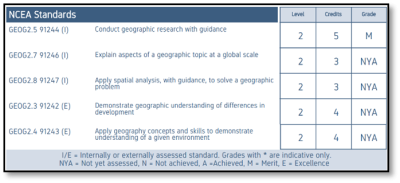 The subject report provides results for assessments in standards that make up the course. At this time of the year, it is not at all unusual to see at least a few ‘NYA’ (Not Yet Assessed) ‘grades’ in the report as there is still a significant amount of course time to go and, therefore, assessment. Teachers are allowed, and are encouraged, to provide an indicative/estimated grade in a standard that indicates how a student is progressing in a standard even if it is not fully assessed at the point of writing. These grades act as feedback on how (well) a student is progressing in the standard and are always subject to change; because there is room for change in a student’s understanding of, and performance in, a standard by the time it is fully completed in an assessment, the estimated grades are merely indicative. On the report, such grades are indicated by an ‘*’. Final summative results for internals do not have the ‘*’. Note that all external standards are only formally assessed in an end-of-year exam or in an externally assessed portfolio.
The subject report provides results for assessments in standards that make up the course. At this time of the year, it is not at all unusual to see at least a few ‘NYA’ (Not Yet Assessed) ‘grades’ in the report as there is still a significant amount of course time to go and, therefore, assessment. Teachers are allowed, and are encouraged, to provide an indicative/estimated grade in a standard that indicates how a student is progressing in a standard even if it is not fully assessed at the point of writing. These grades act as feedback on how (well) a student is progressing in the standard and are always subject to change; because there is room for change in a student’s understanding of, and performance in, a standard by the time it is fully completed in an assessment, the estimated grades are merely indicative. On the report, such grades are indicated by an ‘*’. Final summative results for internals do not have the ‘*’. Note that all external standards are only formally assessed in an end-of-year exam or in an externally assessed portfolio.
Teacher Subject Comment
It is our belief that students must develop the skills, dispositions, and characteristics to lead their own learning both at and beyond school. Increasingly, in learning at the College, the key competencies of managing self, thinking, using language, symbols and texts, relating to others, and participating and contributing are taught alongside curriculum content and skills because they provide the students with the means to develop into an effective learner beyond being ‘only’ a student of, for example, French! Therefore, in the report, teachers are asked to comment on the student as a learner, that is, on how well they engage with their learning, how well they understand what they are learning, what strategies they successfully bring into their learning and what a student could do next to further improve as a learner in the subject. It is primarily about teachers providing meaningful feedback on students’ learning.
In Term 3, many more final results will appear on most students’ results records. Students and their parents can be challenged to keep up with the changes but, when we think of the NCEA awards and of students’ goals related to NCEA achievement, it’s important to not just rely on teachers to tell students how they are doing. Over the last couple of years, we have developed a powerful ‘tool’ to enable all of us to monitor how students are doing. The NCEA Current Results Summary is available to staff, students, and parents so that they can see how things are going. Parents should become well-acquainted with it.
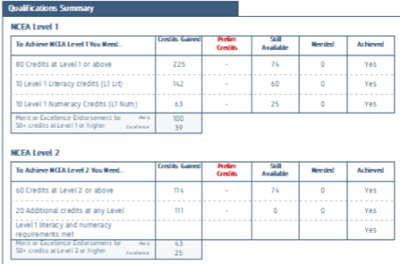 As we head right into the business end of the academic year, this document, updated daily with new results as they go on our database, really comes into its own. The CRS is yours to access as you please through the Community Portal; it is accessible to the students in the same way. At the end of Term 3 academic conference, this document will be referred to by the tutor as it will enable a form of ‘status report’ to be discussed with the student at that time. The CRS is comprehensive and very visual and will enable you to see how well your student is doing with their NCEA assessment and see the progress they are making towards the various NCEA awards – how do they look for gaining NCEA? For gaining an overall NCEA endorsement? For gaining course endorsement? For gaining University Entrance?
As we head right into the business end of the academic year, this document, updated daily with new results as they go on our database, really comes into its own. The CRS is yours to access as you please through the Community Portal; it is accessible to the students in the same way. At the end of Term 3 academic conference, this document will be referred to by the tutor as it will enable a form of ‘status report’ to be discussed with the student at that time. The CRS is comprehensive and very visual and will enable you to see how well your student is doing with their NCEA assessment and see the progress they are making towards the various NCEA awards – how do they look for gaining NCEA? For gaining an overall NCEA endorsement? For gaining course endorsement? For gaining University Entrance?
A tip – In the NCEA Current Results Summary you can find the answer to some of this without having to rely on your student at all. Using your own access to the Community Portal/Results tab, you can access your child’s NCEA results to date. In Term 3, the data showing will change regularly as more and more assessments and assessment programmes are completed. My advice is that you check in weekly and watch the progress and achievement occur – it is able to be viewed on your mobile pretty much as well as on your computer!
Looking ahead at the next year of study (image currently shows only 2024 courses material):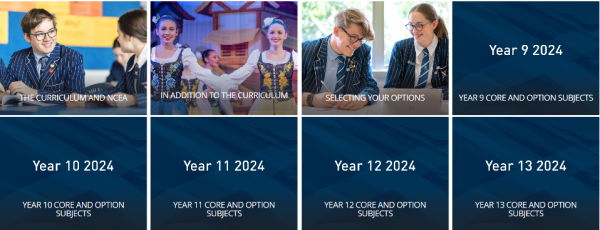
You might wonder why we require our students to select their courses for the next year so seemingly early on. We do this because it takes us a lot of time to put together our staffing and timetables for the following academic year. It’s not something that we can leave until Christmas time and is what all schools do.
To assist students and their parents in this task, we undertake an ongoing comprehensive information plan and process that runs through the first half of next term. That plan and process generate a new ‘hive of activity’ in students’ minds and in their conversations, particularly as they move higher up through the year groups.
I will provide more information to you about this early next term but do be aware that it’s coming. Students need to think about what they will study next year and will be required to make decisions about that, so it must be good decision-making!
A reminder that the Curriculum Book is not a physical book. It is an online version that contains a wealth of links to information including to the course selections tools that are opened at a predetermined time for students to then make their selections.
It can be tempting for students to think that Level 2 is not such a ‘big deal’ when it comes to their NCEA achievement and that it’s sort of a Year 12 equivalent of the Year 10 year! These days, this really couldn’t be further from the truth - students’ Level 2 results hold a great significance. In about 14 months from now, those students (by then, Year 13 students) will be applying for various University Scholarships, Halls of Residence, and other tertiary awards. The key information required by Awards Panels etc. will be students’ Level 2 NCEA results, not Level 3. At the time of applying, Level 2 provides the most recent set of confirmed and final NCEA results so, clearly, the results that the students take through from Level 2 are more important than they might first seem.
